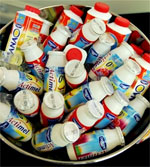She sells small cups of vitamin-enriched yoghurt door-to-door in Orange Farm, a sprawling township of modest houses and makeshift shacks west of Johannesburg.
A year ago, Daka, 50, was struggling to support herself, three children and two orphaned relatives. “Often we didn’t have enough food on a daily basis,” she said. “I’d always been unemployed.”
Now she is a thriving entrepreneur earning around R2 000 per month.
Danone, like other international food groups, is rushing to expand in emerging markets to offset sluggish growth at home. An estimated 4 billion potential consumers around the world live on less than $2 a day.
After less than two years, sales by volume of the new low-cost product, so far only rolled out in the Johannesburg area, are outstripping some of the firm’s major national brands.
“Sales are fantastic,” Maria Pretorius, Danone’s local marketing manager, said of the low-cost product.
Its traditional, higher-priced products, sold through regular distribution channels and supermarkets, are out of reach for most South Africans, a quarter of whose people are unemployed.
“We realized that our products were neither available nor affordable to a great percentage of the South African population,” said Pretorius.
So it created a product with local dairy partner Clover that sells for R1 (14 cents) and set up a separate network of distributors like Daka.
“That was the main challenge, how to make it available because our distribution systems do not go to the townships,” Pretorius said.
“Dani Ladies” are trained to sell in open-air markets or door-to-door in townships.
Danone provides a uniform, a cooler box, a trolley, support and training, but the saleswomen must pay for the product in advance after a pilot credit system was unworkable.
On a recent afternoon, Susan Phungo, 36, was at her roadside stall where she had expanded her business by selling Danimal yoghurt in addition to vegetables and dried beans.
Across the township, Daka was doing a brisk business in a crowded open-air market surrounded by other hawkers selling clothes, vegetables and fruit.
“In the morning I go house-to-house and then in the afternoon I find a busy spot,” said Daka, sitting under a yellow Danone umbrella in her brightly colored “Danimal” T-shirt.
On a busy day she can sell over 700 pots of yoghurt, but the average is around half of that. The saleswomen keep a profit of 20cents from each R1 yoghurt pot they sell.
“It’s made a huge difference in my situation,” said Daka, who is taking care of two orphaned relatives in addition to her own children.
Story from: Reuters
Image from: AFP

